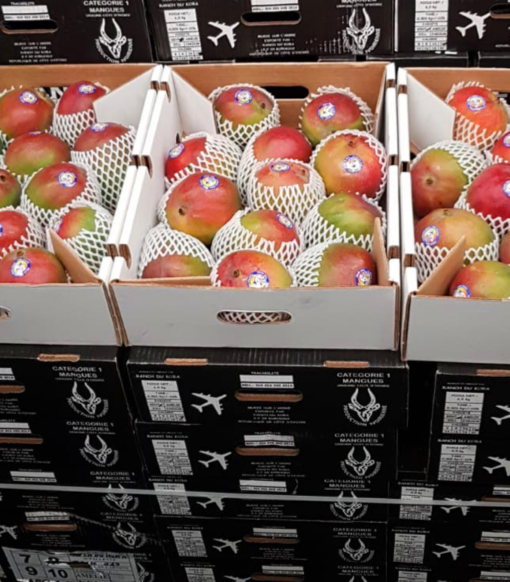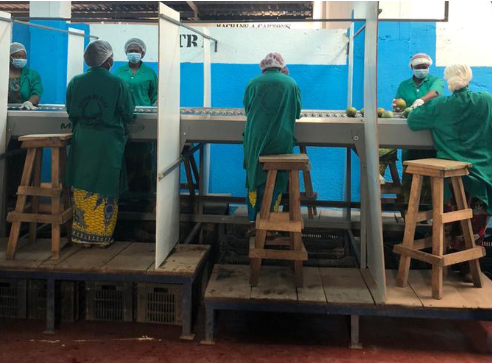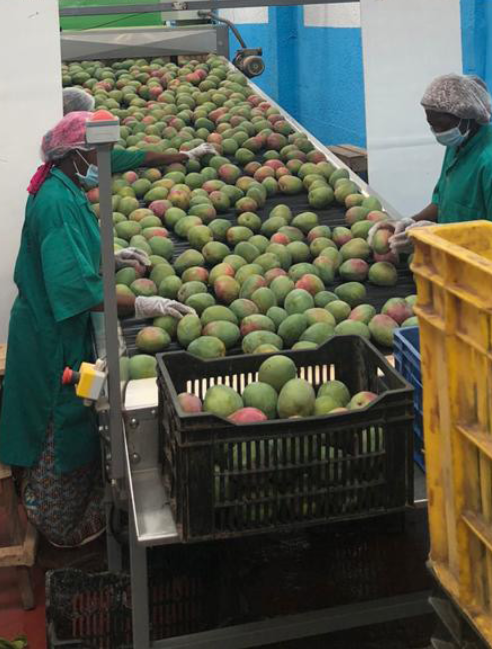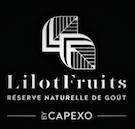Since April 12th, the mango campaign has been in full swing in Ivory Coast, in an unprecedented context: sanitary measures to fight the spread of Covid-19, new working arrangements to continue to harvest and pack products without taking health risks for the teams, drastically reduced international air connections for obvious reasons. The fruits, which are beautiful, are making their way to us, but at what price?
 Vincent Soler, manager of Capexo:
Vincent Soler, manager of Capexo:
“During a normal campaign, freight prices from Ivory Coast are about 1€/kg gross, with the possibility to have flights daily with several airlines. This way, we can load very important volumes.
This year, with the lockdown conditions essential to fight the health crisis, there are only 1 to 2 flights a week, all airlines combined! And with limited spaces on which to load the merchandise.
As a result, freight prices are around 3€/kg gross. And since this unprecedented situation does not only affect Ivory Coast but the whole world, the impact on sale prices is inevitable.”
Vanessa Gournay, logistics manager - Ranch Koba
Here is the testimony from Vanessa Gournay, logistics manager at Ranch Koba, partner producer of Capexo for 24 years, on the sanitary situation and the arrangements put in place to ensure the harvest, packaging and shipping of mangoes by plane:
In this unprecedented context, how is the mango campaign looking this year?
“The campaign started a little later, opening on April 12th, but this had nothing to do with Covid-19. Blooming simply occurred later due to the weather conditions, hence the decision by regional prefects and mango professionals to delay the campaign. Despite the exceptional circumstances, what we can observe suggests a product of very good quality. In Ivory Coast, the opening of the season refers to the Kent variety. It is a very sweet mango full of flavors and with a nice texture. It will be a success!”

The measures taken to fight Covid-19 affect our daily lives...How is it going in Ivory Coast?
“Overall, the government has applied the same measures as in many European countries. Schools are closed, public transport can only accommodate half of the passengers to limit contact...The lockdown is also in effect, although more at the city level than at the individual level, within each household. However, there is a curfew on the whole territory: everyone must stay home from 9pm to 5am.”
What are the consequences for economic actors?
“The government has imposed the closure of factories at 7.30pm, in order to give people enough time to get home before the curfew. Free movement between the north and the south of the country is still authorized for merchandise, but forbidden for people. This is good news for us. The north is the mango region and the airport is located in the south...But we must act responsibly and take the necessary measures to protect our employees.”
For the mango campaign, what are the consequences of Covid-19 on the supply chain?

“Several factors are causing an overall slowdown across the entire supply chain. Local supply is more complicated because the harvesting staff must be limited. Additionally, work has slowed down by at least 40% in packaging stations: the curfew is limiting the opening hours and there are obviously fewer workers in order to respect the 1.20m distance between employees. Shipping by plane also poses several difficulties. There are fewer flights and the remaining flights have often tripled their freight rates...This has an inevitable impact on sale prices. At Ranch Koba, we had to be given the means in order to ensure export while minimizing the risks. Our clients, like Capexo, have indeed received their first mangoes.”
How did you adapt at Ranch Koba?
“Before opening the factories, we established new protocols, set up the necessary installations. We had to get the approval of phytosanitary agents, train all our staff, explain the measures and new arrangements. We had a general discussion on how to care for our employees, through their entire journey. Because before getting to work, the first step is transportation. We send a bus every morning to bring our employees from their homes to Ranch Koba. We now have several buses to respect sanitary measures and limit contacts...Before getting in the bus: hands must be washed with hydroalcoholic gel, temperatures are checked and masks are obligatory. The same process is repeated in the evening, when our employees are driven back home. Once at Ranch Koba, the buses are disinfected with bleach and hands are washed once again. Of course, safety distances are implemented, so workstations had to be rearranged: partitions are installed on the whole production chain and the number of sorters has been reduced to avoid having several employees working on the same bin. Gloves and hairnets are always obligatory. Now, masks are too and must be changed several times a day.”
Mask supply is complicated in France. How is it for you?
“Ivory Coast is suffering from a shortage of masks, like many other countries. We were able to get some, but not enough. We had to have cloth masks made by local seamstresses. Since the opening of factories, they are collected and washed every evening by us. The north of Ivory Coast is not too impacted by the pandemic for the moment, but we must remain cautious. We cannot know how the situation will evolve. And our priority is to protect!”
For more information:
François Bellivier
Capexo
Phone: 01 41 73 23 00
Mobile: 06 75 03 76 54
f.bellivier@capexo.fr
www.capexo.fr
